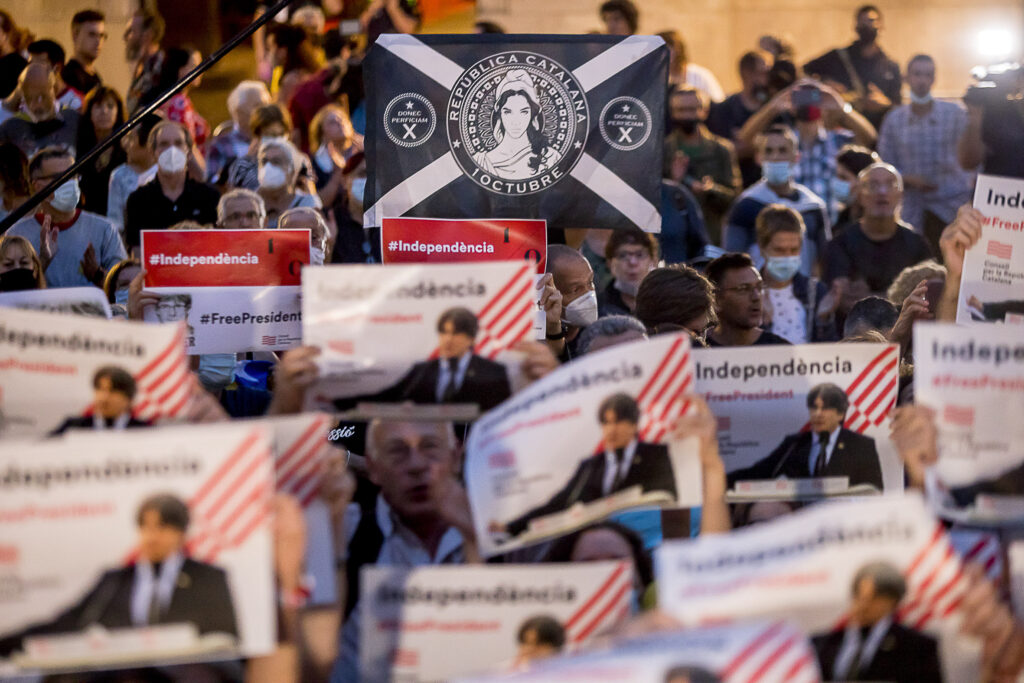27.09.2021 - 08:17
|
Actualització: 27.09.2021 - 10:17
The arrest of Carles Puigdemont last week on Thursday in Sardinia caused shockwaves across the continent. On Friday afternoon, Puigdemont was brought before a court on the Italian island that made the provisional decision to release him from custody and allow him to travel freely throughout the European Union. The exiled Catalan president will have to appear before the court again for the full hearing on 4 October.
Very soon, people took the streets in Catalonia to protest against what they considered an illegal detention. But there were also rallies and demonstrations far away from Catalonia. Protests took place on Friday in London, Dublin, Brussels, Toulouse, Perpignan, Luxembourg, to demand the immediate release of Puigdemont. In England, supporters demonstrated in front of the Italian embassy in London and handed ‘Free Puigdemont’ posters to staff members there. The Italian embassy in Ireland was also the focal point of the protest in Dublin.
In Brussles, Place de Luxembourg was the scene of Friday’s demonstration. Toulouse held an evening protest at Place du Capitole, while Perpignan, known as ‘North Catalonia’ as that region of France used to sit within the Catalan borders, held a demonstration in support of Puigdemont in front of the Spanish consulate. Bilbao and Pamplona in the Basque Country also held demonstrations for the same cause.
‘Shocking’ arrest
Political leaders around the continent and beyond also reacted with messages of support for the exiled Catalan leader. MEP Mick Wallace, from Ireland, described the arrest as “shocking” on Twitter while linking to an article from the English newspaper The Guardian. “The EU lectures particular countries about ‘Human Rights’ and ‘Rule of Law’ when it suits its geopolitical agenda, but can’t get it’s own house in order,” the MEP wrote.
Wallace’s ally in the European chamber, Clare Daly, echoed the same sentiments and blasted the “flagrant abuse of EU law” to “persecute” Puigdemont. “It makes a mockery of the rule of law in Europe. I & others will not be standing by while Member States distort the EU to carry out a vendetta against political opponents,” she wrote.
Andrej Hunko, a German politician who has been a member of the Parliamentary Assembly of the Council of Europe, also gave his “solidarity” to Puigdemont, and described his “unlawful arrest” as “unacceptable.” He also added that the “political persecution by the Spanish judiciary must finally stop.” Hunko’s colleague Martin Schirdewan also tweeted his support. “The conflict over the independence of Catalonia and the future of the Spanish state can only be resolved through political dialogue, but not with prison cells,” he said.
Former MEP and Belgian senator Mark Demesmaeker added his name to the “solidarity and support” for Puigdemont. He tweeted, “Respect for democratic rights and EU law implies his immediate release!” Gianni Vernetti, a former senator in Italy, defended that an MEP must be able to travel freely throughout Europe. “The Italian judiciary is making a serious mistake,” he concluded.
The president of the Kabyle provisional government, Ferhat Mehenni, tweeted his “full support” for the former Catalan president.
International news
The story of Puigdemont’s arrest and release made headlines in the biggest news outlets across the planet. The New York Times published an article on the breaking news of the arrest of the former president and followed it up with an analysis of his extradition case. The ex-head of the Catalan government was also the top news story on the BBC’s international news page for some time after the story broke. The news was also reported in one of Australia’s biggest newspapers, The Canberra Times.
As the arrest took place in Italy, outlets in the southern European country followed the story closely. The story was covered on RAI, Italy’s national public broadcasters, as well as La Repubblica, Corriere della sera, Agenzia Ansa, and the most important newspaper in Sardinia, L’Unione Sarda.
German outlets made reference to the fact that Puigdemont was detained in Germany in 2018, only to be given his freedom when the German judiciary only agreed to extradite Puigdemont for misuse of public funds and not sedition, as the Spanish Supreme Court wanted. The story featured in some of the country’s biggest news outlets such as Der Spiegel and Deutsche Welle.


